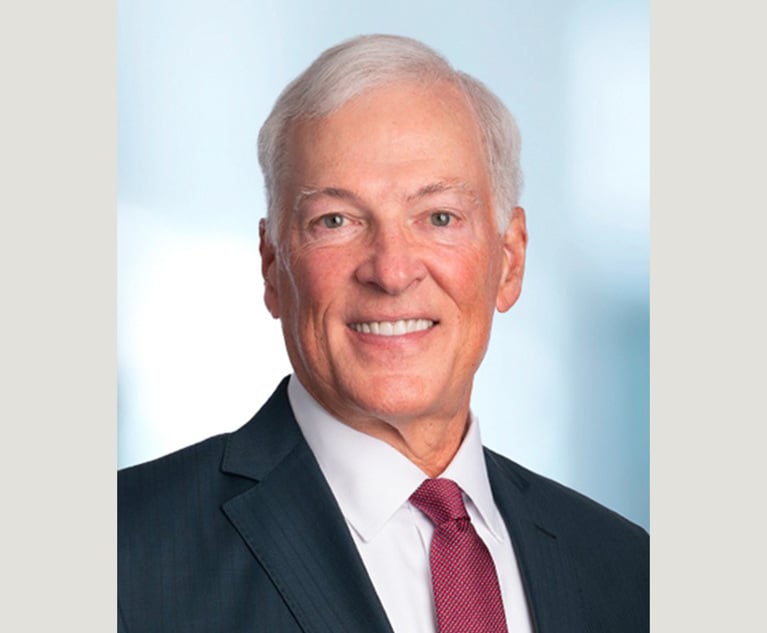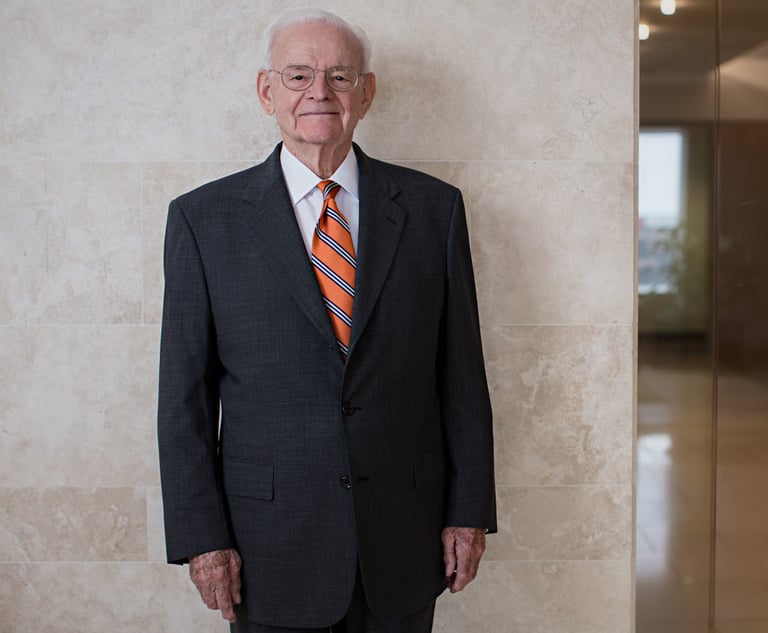 Superior Court Judge Deborah Kunselman, candidate for the Pennsylvania Supreme Court. Courtesy photo
Superior Court Judge Deborah Kunselman, candidate for the Pennsylvania Supreme Court. Courtesy photo Judge Deborah Kunselman Runs for State Supreme Court
I believe appellate judges should try to reach a majority consensus when setting legal precedent. I would collaborate with my fellow justices as much as possible if elected to the Supreme Court.
April 17, 2023 at 12:39 PM
6 minute read
Candidate: Judge Debbie Kunselman
Court: Supreme Court of Pennsylvania
Party: Democrat
Pennsylvania Bar Association Rating: Highly Recommended
The following has been edited lightly for length and style.
The Legal Intelligencer: Tell us about your background, where you went to law school, what firms you have practiced at, and areas of law you focus on.
Judge Debbie Kunselman: I am honors graduate of both Penn State University and the University of Notre Dame Law School. As an attorney for 13 years, my practice focused on personal injury, family law, employment discrimination and municipal law. For eight of those years, I served part-time as the chief county solicitor for Beaver County. In that role, I handled legal issues involving major construction projects in the county, including a new jail, a courthouse addition and a parking garage. I handled the county's takeover of the community college, and implementation of electronic voting. I also advised the county commissioners on contracts, employment, election law, tax assessment, and other legal issues affecting the operation of county government.
In 2005, I was the first woman elected to the Court of Common Pleas of Beaver County. For 12 years, I presided over hundreds of jury and non-jury trials. I handled family law, juvenile delinquency and dependency, criminal and civil cases. I developed and implemented procedures under Act 53, which allows parents of addicted children to petition the court for involuntary placement so their child could receive in-patient drug and alcohol treatment. I significantly reduced our backlog of civil cases that were more than 2 years old. I visited all of the juvenile detention centers where I sent teenagers to ensure they were safe, suitable and well-staffed.
In 2017, I was elected to the Superior Court of Pennsylvania, where I have decided over 3,000 appeals, including several high-profile cases.
Throughout my career, I have taught numerous continuing legal and judicial education classes. I served for six years on the education committee for the conference of state trial judges. The Pennsylvania Bar Association rated me "highly recommended" for a position on the Supreme Court.
The Legal: What is one major thing about your career experience that most qualifies you for this position, and why?
Kunselman: I am uniquely qualified for a position as a Supreme Court justice because I am the only candidate with significant experience at both the trial court and the appellate court. With more than 17 years of judicial experience (12 years at the trial court, and more than five years on the Superior Court), I have served as a judge longer than any of my opponents. I also have the most diverse legal background, having worked in family law, civil litigation, government, juvenile and criminal law. I have already decided nearly every type of case that will come before the Supreme Court.
The Legal: What is the main reason Pennsylvania voters should pick you?
Kunselman: Voters should choose me because I am the most experienced candidate for this job. My decisions on high-profile cases on both the trial court and the Superior Court show that I am the most prepared candidate to decide the significant cases that will come before the Supreme Court. Additionally, because I served as an administrative judge at the trial court for family, civil and juvenile cases, I am prepared to assume the supervisory responsibilities of a Supreme Court justice in overseeing the entire judicial branch of government.
The Legal: What will be your approach to moving matters efficiently through the case management system?
Kunselman: Generally, my approach to moving matters efficiently through the case management system will be to resolve the simplest cases first and then address the more difficult ones. On the Superior Court, I post charts in my office of all cases assigned to me. This way my law clerks and I keep track of what cases are due each month. My staff and I work as a team to get my opinions done timely and efficiently. Almost all my cases are decided within 60 days (and many within 30 days) of being assigned. However, my motto is "better right than rushed." On occasion, complex cases may require more thorough research and analysis, but I still try to get those decisions filed as quickly as possible.
I believe collaboration with other judges is important. Before taking the time to draft a concurrence or dissent, if I disagree with a proposed decision from one of my colleagues, I will call them or send them an email to discuss my thoughts. This way, I may persuade them to revise their decision, or I may change my own views and agree with them. Collaboration drastically reduces the need for multiple writings and the time necessary to circulate and vote on ancillary opinions. I believe appellate judges should try to reach a majority consensus when setting legal precedent. I would collaborate with my fellow justices as much as possible if elected to the Supreme Court.
The Legal: What would you say to voters regarding your plans to ensure the equal administration of justice for all people?
Kunselman: The court system currently works to ensure equal treatment based on race, gender, age, religion, national origin, and sexual orientation, and I will continue to do so if elected to the Supreme Court. My plan, however, is also to ensure the equal administration of justice for all people regardless of their income. For example, I want to ensure that people in family law cases are not being charged exorbitant fees for master's hearings, while corporations and parties in other civil cases are not charged at all for their court hearings. I want to ensure that low-income criminal offenders are not perpetually stuck in the court system after serving their initial sentence, solely because of an inability to pay costs and fines. For those individuals on probation who cannot afford to pay costs and fines, the legislature should allow courts to impose alternative means of punishment like community service. Courts should not send people back to jail for technical probation violations solely because they are poor. Finally, with help from other branches of government, I would like to see juror pay increased so that low-income people can afford to miss work to serve on a jury. Many people are excused from jury service based on financial hardship. Increasing juror pay would enable more people to participate in the legal system and give a more diverse jury pool, which would better reflect a trial by one's peers. These are just a few examples of changes I would like to see, and I would look for other ways to ensure the equal administration of justice for all without regard to income.
The Legal: Where can voters go for more information about you?
Kunselman: www.kunselmanforpa.com or Facebook: Judge Debbie Kunselman
NOT FOR REPRINT
© 2025 ALM Global, LLC, All Rights Reserved. Request academic re-use from www.copyright.com. All other uses, submit a request to [email protected]. For more information visit Asset & Logo Licensing.
You Might Like
View All
Superior Court Directs Western Pa. Judge to Recuse From Case Over Business Ties to Defendant
3 minute read
Saxton & Stump Lands Newly Retired Ex-Chief Judge From Middle District of Pa.
3 minute read
'Discordant Dots': Why Phila. Zantac Judge Rejected Bid for His Recusal
3 minute read
Judge Louis C. Bechtle: An American Jurist Who Relied on Common Sense, Sound Judgment and Fairness
5 minute readTrending Stories
- 1Uber Files RICO Suit Against Plaintiff-Side Firms Alleging Fraudulent Injury Claims
- 2The Law Firm Disrupted: Scrutinizing the Elephant More Than the Mouse
- 3Inherent Diminished Value Damages Unavailable to 3rd-Party Claimants, Court Says
- 4Pa. Defense Firm Sued by Client Over Ex-Eagles Player's $43.5M Med Mal Win
- 5Losses Mount at Morris Manning, but Departing Ex-Chair Stays Bullish About His Old Firm's Future
Who Got The Work
J. Brugh Lower of Gibbons has entered an appearance for industrial equipment supplier Devco Corporation in a pending trademark infringement lawsuit. The suit, accusing the defendant of selling knock-off Graco products, was filed Dec. 18 in New Jersey District Court by Rivkin Radler on behalf of Graco Inc. and Graco Minnesota. The case, assigned to U.S. District Judge Zahid N. Quraishi, is 3:24-cv-11294, Graco Inc. et al v. Devco Corporation.
Who Got The Work
Rebecca Maller-Stein and Kent A. Yalowitz of Arnold & Porter Kaye Scholer have entered their appearances for Hanaco Venture Capital and its executives, Lior Prosor and David Frankel, in a pending securities lawsuit. The action, filed on Dec. 24 in New York Southern District Court by Zell, Aron & Co. on behalf of Goldeneye Advisors, accuses the defendants of negligently and fraudulently managing the plaintiff's $1 million investment. The case, assigned to U.S. District Judge Vernon S. Broderick, is 1:24-cv-09918, Goldeneye Advisors, LLC v. Hanaco Venture Capital, Ltd. et al.
Who Got The Work
Attorneys from A&O Shearman has stepped in as defense counsel for Toronto-Dominion Bank and other defendants in a pending securities class action. The suit, filed Dec. 11 in New York Southern District Court by Bleichmar Fonti & Auld, accuses the defendants of concealing the bank's 'pervasive' deficiencies in regards to its compliance with the Bank Secrecy Act and the quality of its anti-money laundering controls. The case, assigned to U.S. District Judge Arun Subramanian, is 1:24-cv-09445, Gonzalez v. The Toronto-Dominion Bank et al.
Who Got The Work
Crown Castle International, a Pennsylvania company providing shared communications infrastructure, has turned to Luke D. Wolf of Gordon Rees Scully Mansukhani to fend off a pending breach-of-contract lawsuit. The court action, filed Nov. 25 in Michigan Eastern District Court by Hooper Hathaway PC on behalf of The Town Residences LLC, accuses Crown Castle of failing to transfer approximately $30,000 in utility payments from T-Mobile in breach of a roof-top lease and assignment agreement. The case, assigned to U.S. District Judge Susan K. Declercq, is 2:24-cv-13131, The Town Residences LLC v. T-Mobile US, Inc. et al.
Who Got The Work
Wilfred P. Coronato and Daniel M. Schwartz of McCarter & English have stepped in as defense counsel to Electrolux Home Products Inc. in a pending product liability lawsuit. The court action, filed Nov. 26 in New York Eastern District Court by Poulos Lopiccolo PC and Nagel Rice LLP on behalf of David Stern, alleges that the defendant's refrigerators’ drawers and shelving repeatedly break and fall apart within months after purchase. The case, assigned to U.S. District Judge Joan M. Azrack, is 2:24-cv-08204, Stern v. Electrolux Home Products, Inc.
Featured Firms
Law Offices of Gary Martin Hays & Associates, P.C.
(470) 294-1674
Law Offices of Mark E. Salomone
(857) 444-6468
Smith & Hassler
(713) 739-1250





